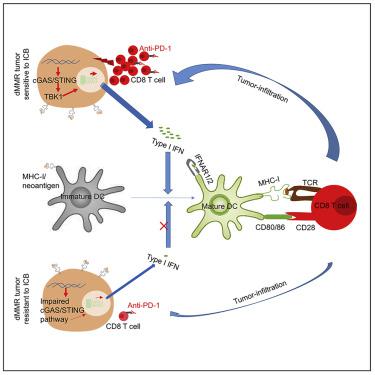Cancer Cell ( IF 48.8 ) Pub Date : 2020-12-17 , DOI: 10.1016/j.ccell.2020.11.006 Changzheng Lu 1 , Junhong Guan 2 , Steve Lu 3 , Qihuang Jin 2 , Benoit Rousseau 4 , Tianshi Lu 5 , Dennis Stephens 4 , Hongyi Zhang 6 , Jiankun Zhu 1 , Mingming Yang 2 , Zhenhua Ren 1 , Yong Liang 1 , Zhida Liu 1 , Chuanhui Han 1 , Longchao Liu 1 , Xuezhi Cao 1 , Anli Zhang 1 , Jian Qiao 1 , Kimberly Batten 7 , Mingyi Chen 1 , Diego H Castrillon 8 , Tao Wang 5 , Bo Li 6 , Luis A Diaz 4 , Guo-Min Li 2 , Yang-Xin Fu 1

|
Increased neoantigens in hypermutated cancers with DNA mismatch repair deficiency (dMMR) are proposed as the major contributor to the high objective response rate in anti-PD-1 therapy. However, the mechanism of drug resistance is not fully understood. Using tumor models defective in the MMR gene Mlh1 (dMLH1), we show that dMLH1 tumor cells accumulate cytosolic DNA and produce IFN-β in a cGAS-STING-dependent manner, which renders dMLH1 tumors slowly progressive and highly sensitive to checkpoint blockade. In neoantigen-fixed models, dMLH1 tumors potently induce T cell priming and lose resistance to checkpoint therapy independent of tumor mutational burden. Accordingly, loss of STING or cGAS in tumor cells decreases tumor infiltration of T cells and endows resistance to checkpoint blockade. Clinically, downregulation of cGAS/STING in human dMMR cancers correlates with poor prognosis. We conclude that DNA sensing within tumor cells is essential for dMMR-triggered anti-tumor immunity. This study provides new mechanisms and biomarkers for anti-dMMR-cancer immunotherapy.
中文翻译:

错配修复缺陷肿瘤细胞中的 DNA 传感对于抗肿瘤免疫至关重要
有 DNA 错配修复缺陷 (dMMR) 的超突变癌症中新抗原的增加被认为是抗 PD-1 治疗中高客观反应率的主要因素。然而,耐药性的机制尚不完全清楚。使用 MMR 基因Mlh1缺陷的肿瘤模型(dMLH1),我们显示 dMLH1 肿瘤细胞积累细胞溶质 DNA 并以 cGAS-STING 依赖性方式产生 IFN-β,这使得 dMLH1 肿瘤缓慢进展并对检查点阻断高度敏感。在新抗原固定模型中,dMLH1 肿瘤有效地诱导 T 细胞启动并失去对检查点治疗的抵抗力,而与肿瘤突变负荷无关。因此,肿瘤细胞中 STING 或 cGAS 的缺失会减少 T 细胞的肿瘤浸润并赋予对检查点阻断的抵抗力。临床上,人类 dMMR 癌症中 cGAS/STING 的下调与不良预后相关。我们得出结论,肿瘤细胞内的 DNA 感应对于 dMMR 触发的抗肿瘤免疫至关重要。该研究为抗 dMMR 癌症免疫治疗提供了新的机制和生物标志物。











































 京公网安备 11010802027423号
京公网安备 11010802027423号